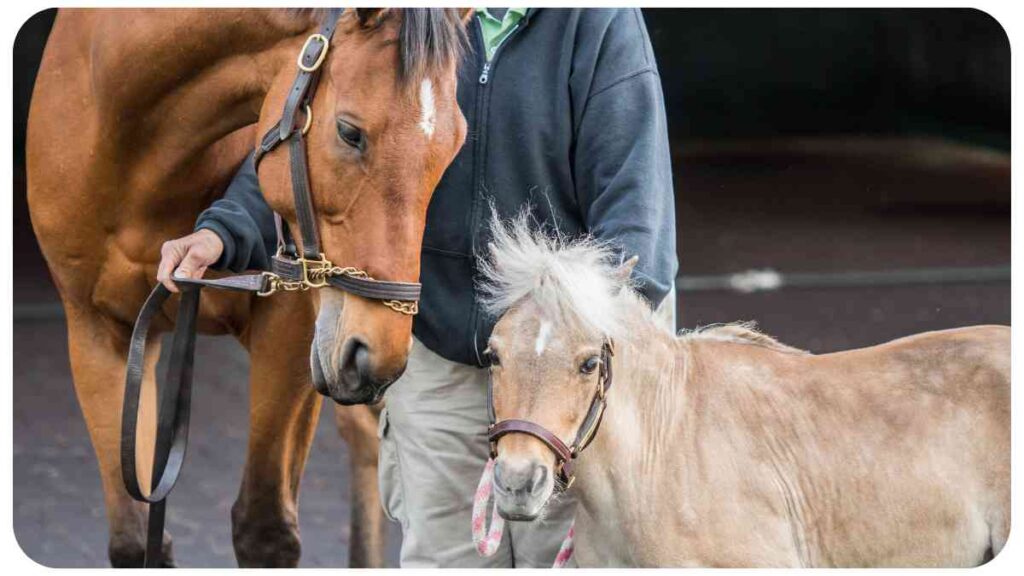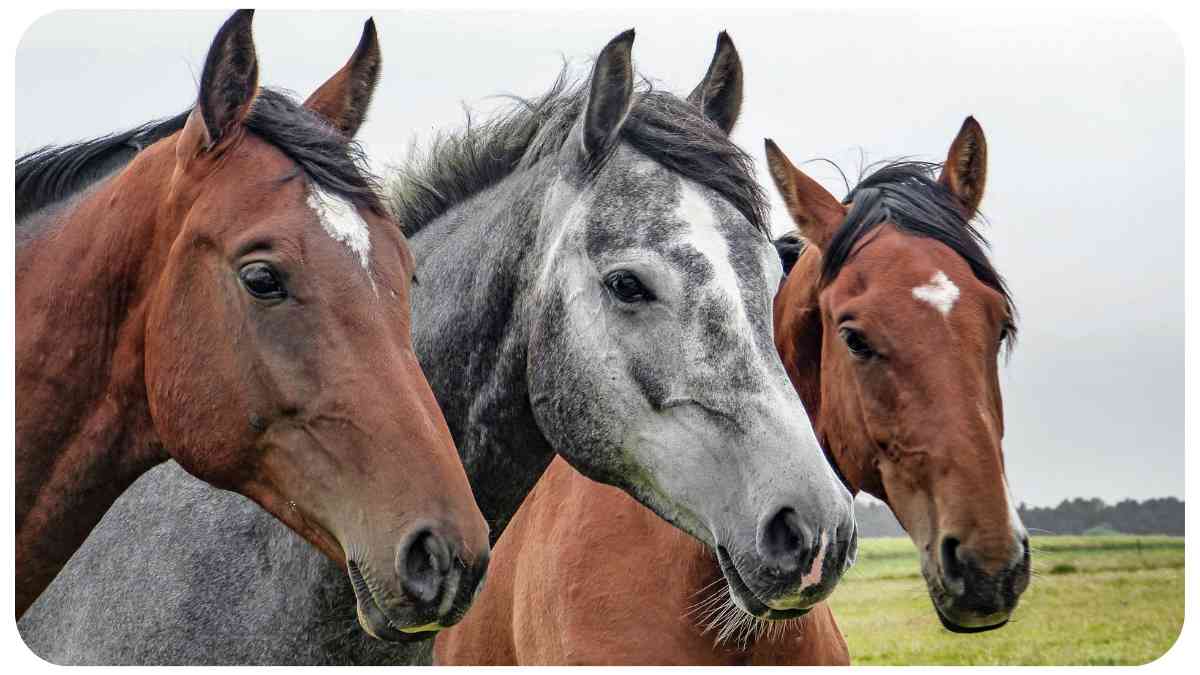Choosing the right horse breed for your needs is a crucial decision that requires careful consideration. Horses come in various breeds, each with unique characteristics that make them suitable for specific purposes.
Whether you’re a beginner or an experienced rider, it’s important to choose a breed that aligns with your goals, riding style, and level of expertise. In this article, I will provide valuable insights and expert advice to help you navigate the process of selecting the perfect horse breed.
| Choosing the Right Horse Breed |
| – Understand your needs and goals as a rider before selecting a breed |
| – Consider the temperament of the horse, especially for novice riders |
| – Assess the size of the horse based on your riding style and activities |
| – Different horse breeds excel in different riding styles, so choose accordingly |
| – Decide between purebred and crossbred horses, considering their pros and cons |
| – Evaluate the health and longevity of different horse breeds |
| – Take your budget into account and be prepared for ongoing horse care expenses |
| – Consider factors related to horse care, such as stabling, exercise, grooming, and more |
| – Research, seek advice, and take your time to make an informed decision |
Understanding Your Needs and Goals
Before diving into the specifics of horse breeds, it’s essential to understand your needs and goals as a rider. Are you looking for a horse for recreational riding, competitive sports, or a specific discipline such as dressage or show jumping? Assessing your requirements will help you narrow down your options and ensure a suitable match for your equestrian endeavors.
If you’re a beginner rider, the Top 15 Horse Breeds can be a great choice. From gentle and reliable to versatile and friendly, these breeds are perfect for novice riders.
Table: Horse Breeds at a Glance
Below is a table providing a summary of different horse breeds and their primary characteristics:
| Breed | Primary Characteristics |
| Thoroughbred | Athletic, fast, suitable for racing and sport |
| Quarter Horse | Versatile, calm, excellent for Western riding |
| Arabian | Elegant, endurance, well-suited for long-distance riding |
| Appaloosa | Spotted coat patterns, versatile for various activities |
| Andalusian | Graceful, intelligent, ideal for dressage |
| Friesian | Majestic appearance, versatile for riding and driving |
| Mustang | Hardy, versatile, descended from wild horses |
| Tennessee Walker | Smooth gait, comfortable for trail riding |
| Haflinger | Strong, friendly, great for pleasure riding |
| Clydesdale | Powerful, heavy breed, often used for draft purposes |
Note: This table provides just a glimpse of the many horse breeds available. Further research and consultation with experienced breeders or trainers will help you make a well-informed decision.
Considerations for Novice Riders
If you’re new to horse riding, it’s crucial to choose a breed that is beginner-friendly and forgiving. Novice riders often require a horse with a calm temperament, patience, and a willingness to cooperate.
Table: Beginner-Friendly Horse Breeds
Consider the following horse breeds known for their suitability for novice riders:
| Breed | Characteristics |
| Icelandic | Small and gentle, known for their smooth gaits and high intelligence |
| Morgan | Versatile, friendly, easy to handle, and suitable for a variety of equestrian pursuits |
| Paint | Calm and reliable, often ideal for trail riding and leisurely outings |
| American Saddlebred | Gentle, elegant, and often used for pleasure riding and show purposes |
Novice riders would benefit from starting their equestrian journey by considering these breeds. They possess the qualities needed to provide a safe and enjoyable experience for riders who are still developing their skills.
Choosing the right horse breed can be overwhelming, but the 10 Most Popular Horse Breeds guide can help you make an informed decision based on your preferences and needs
The Importance of Size and Temperament

When choosing a horse breed, it’s important to consider both the size and temperament of the horse. Size matters for several reasons, including rider comfort, stability, and the type of activities you intend to pursue.
Table: Popular Horse Breeds by Size and Temperament
The following table outlines various horse breeds based on their average size and temperament:
| Breed | Size | Temperament |
| Shetland Pony | Small (under 10 hands) | Often mischievous, but friendly |
| Paso Fino | Medium (13-15 hands) | Calm, smooth-gaited |
| Percheron | Large (16-17 hands) | Docile, used for draft purposes |
| Belgian | Extra Large (over 17 hands) | Strong, gentle, and suitable for work |
Remember, these are just a few examples, and there are many more breeds available for you to explore. Consider the size and temperament that will best suit your riding style and preferences.
Assessing Your Riding Style
Understanding your riding style is crucial when selecting the right horse breed. Different breeds excel in various disciplines, such as dressage, show jumping, trail riding, or racing. Consider the type of riding you plan to pursue and choose a breed that aligns with your goals.
Discover the versatile abilities of the American Quarter Horse breed. Known for their speed, versatility, and agility, these horses excel in various disciplines including racing, ranch work, and more.
Table: Horse Breeds by Riding Style Compatibility
The table below highlights horse breeds known for their compatibility with specific riding styles:
| Riding Style | Compatible Horse Breeds |
| Dressage | Andalusian, Hanoverian, Warmblood |
| Show Jumping | Irish Sport Horse, Dutch Warmblood, Thoroughbred |
| Trail Riding | Quarter Horse, Tennessee Walker, Paint |
| Racing | Thoroughbred, Arabian, Quarter Horse |
| Western Riding | Quarter Horse, Appaloosa, Paint |
Remember, some horses can excel in multiple disciplines, but it’s essential to consider a breed that aligns with your primary riding style.
Choosing Between Purebred and Crossbred Horses
Another important decision to make is whether to choose a purebred or a crossbred horse. Both options come with their own set of advantages and considerations.
Table: Purebred and Crossbred Horse Pros and Cons
Here’s a table outlining the pros and cons of purebred and crossbred horses:
| Type | Pros | Cons |
| Purebred | Predictable traits and characteristics | Limited genetic diversity, potential health issues |
| Crossbred | Hybrid vigor, broader genetic diversity | Less predictability, potential inconsistencies |
Consider your needs, preferences, and the specific characteristics you desire in a horse when deciding between purebred and crossbred options.
Evaluating Horse Health and Longevity

Investigate the health and longevity of various horse breeds before making a decision. Opting for a breed known for its robust health can save you from future difficulties and expenses.
Looking for a comprehensive guide to horse breeds? Check out the Ultimate Guide to Horse Breeds and explore the diverse characteristics and histories of breeds ranging from elegant Arabians to hardy Welsh ponies.
Table: Horse Breeds with Good Health and Longevity
Consider the following breeds known for their good health and longevity:
| Breed | Health and Longevity Traits |
| Arabian | Hardy breed, known for longevity and resistance to various ailments |
| Morgan | Generally healthy and long-lived |
| Icelandic | Robust and resilient, with long lifespans |
| Appaloosa | Generally hardy and less prone to certain health issues |
Ensuring the well-being and longevity of your horse is essential for a fulfilling equestrian experience.
Determining Your Budget
When choosing a horse breed, it’s crucial to consider your budget. Horse expenses go beyond the initial purchase cost, including ongoing care, veterinary expenses, training, and equipment. Be realistic about what you can afford and assess the long-term financial commitment involved in owning a horse.
Factors to Consider for Horse Care
Alongside choosing the right breed, consider factors related to horse care. These include suitable stabling, exercise requirements, grooming needs, and nutritional considerations. The specific care requirements will vary depending on the breed you choose, so ensure you’re prepared to meet their specific needs.
Delve into the fascinating history and evolution of equestrian sports with the article Looking Back in Time: The Evolution of Equestrian Sports. From ancient cavalry to modern-day competitions, this article explores the rich heritage of horse-related sports.
Conclusion
Choosing the right horse breed for your needs is a significant decision that requires careful consideration. By understanding your goals, assessing your riding style, considering size and temperament, evaluating health and longevity, and factoring in your budget, you can make an informed choice.
Remember to research extensively, seek advice from professionals, and take your time in making this important decision. With the right breed, you’ll embark on a fulfilling equestrian journey that suits your needs and brings you joy and success.
Further Reading
Here are some additional resources you may find helpful for furthering your understanding of choosing the right horse breed:
Blue Cross: Choosing a Riding Horse: This comprehensive guide from Blue Cross provides valuable advice and insights on selecting the right horse for your riding needs. It covers various aspects of horse care and considerations to keep in mind during the selection process.
Equine Helper: Choosing the Right Horse – Tips: Equine Helper offers practical tips and guidance for choosing the right horse. The article explores essential factors like temperament, purpose, and health, helping you make an informed decision.
The Spruce Pets: Best Breeds for First-Time Horse Owners: The Spruce Pets provides a list of horse breeds suitable for first-time horse owners. The article highlights specific breeds known for their beginner-friendliness, making it easier for novices to choose the right horse.
FAQs
What factors should I consider when choosing a horse breed?
When choosing a horse breed, consider factors such as your riding goals, experience level, size and temperament preferences, and the specific discipline you plan to pursue.
Are purebred horses a better choice than crossbred horses?
Both purebred and crossbred horses have their pros and cons. Purebred horses offer predictability in traits, while crossbred horses possess hybrid vigor and genetic diversity. Consider your specific needs and preferences when deciding between the two.
How important is the temperament of a horse?
The temperament of a horse is crucial, especially for novice riders. A calm and cooperative temperament makes the learning process easier and the riding experience more enjoyable. However, advanced riders may seek horses with certain temperaments that align with their specific goals.
What are some beginner-friendly horse breeds?
Beginner-friendly horse breeds include the Icelandic, Morgan, Paint, and American Saddlebred. These breeds are known for their calm temperament, ease of handling, and versatility.
How do I assess the health and longevity of a horse breed?
Researching a breed’s health history, consulting with experienced breeders, and evaluating general health indicators such as genetic diseases and common ailments can help assess the health and longevity of a horse breed. Additionally, seeking veterinary advice before making a decision is highly recommended.

Hi there! My name is Hellen James, and I’m a horse riding expert. I’ve been riding horses since I was just a kid—and it’s been my passion ever since. But getting started with horse riding can be overwhelming. There’s so much to learn! If you’re looking for a way to get started and make sure you’re doing it right, I’m here to help.


